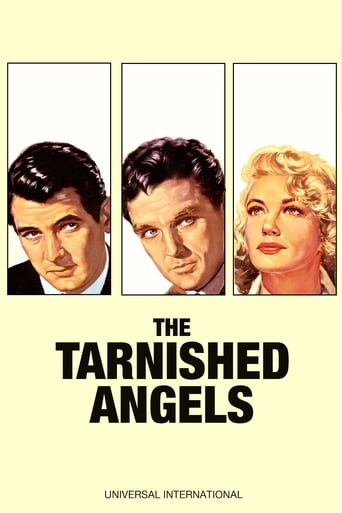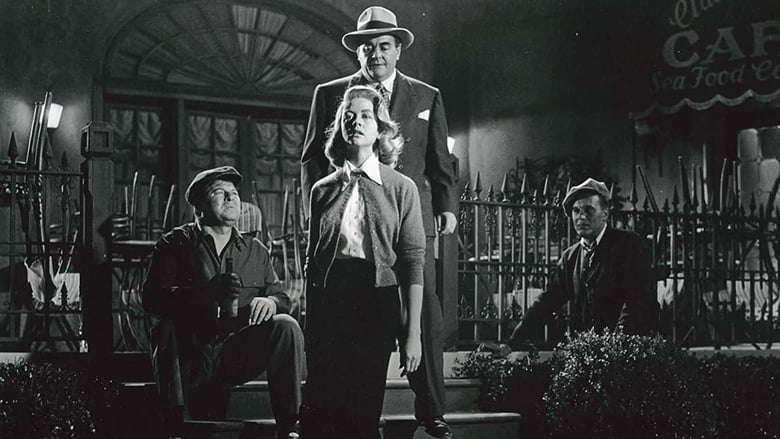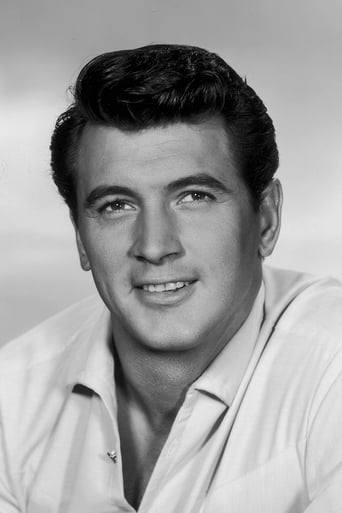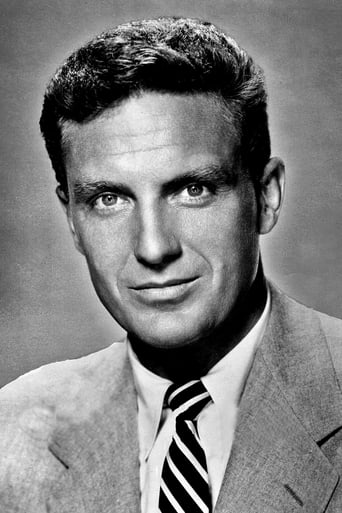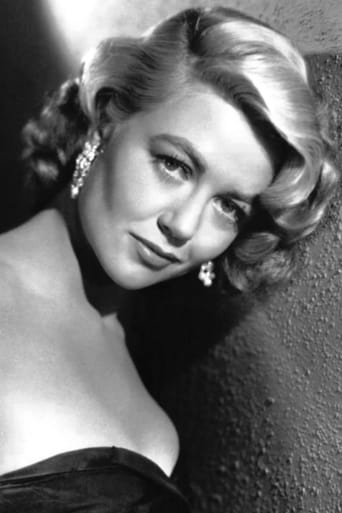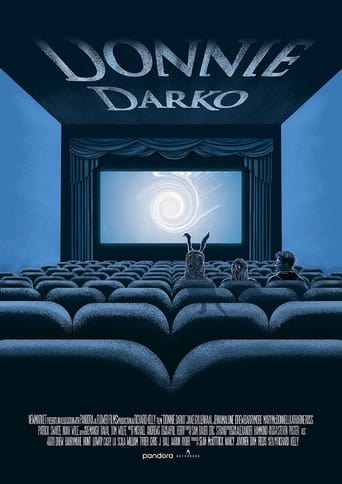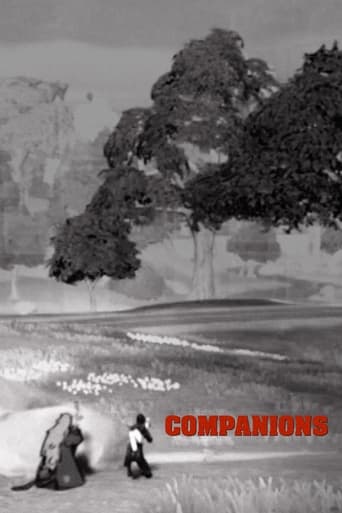The Tarnished Angels (1958)
In the 1930s, once-great World War I pilot Roger Shumann performs as a daredevil barnstorming pilot at aerial stunt shows while his wife, LaVerne, works as a parachutist. When newspaper reporter Burke Devlin arrives to do a story on the Shumanns’ act, he quickly falls in love with the beautiful--and neglected--LaVerne.
Watch Trailer
Cast
Similar titles

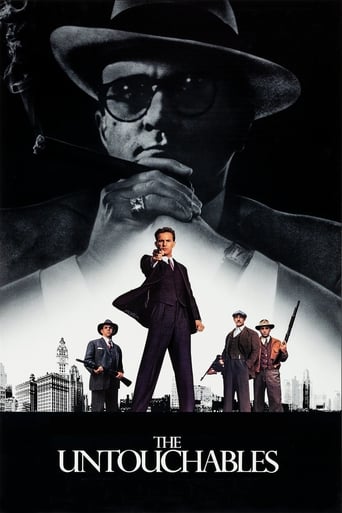
Reviews
Good story, Not enough for a whole film
Good movie but grossly overrated
There is, somehow, an interesting story here, as well as some good acting. There are also some good scenes
Through painfully honest and emotional moments, the movie becomes irresistibly relatable
Terrific Douglas Sirk melodrama from the William Faulkner novel "Pylon." I have not read the Faulker book, but I'm guessing it was nowhere as soapy as the film, but as soapy melodrama's go, no one does them better than Douglas Sirk. Robert Stack plays a boozy disillusioned WWI flying ace who now spends his days as a barnstorming pilot at rural carnivals with his neglected parachutist wife, Dorothy Malone, who he only married as a result of a literal roll of the dice. Rock Hudson plays a reporter doing a story on this dysfunctional traveling family of flyers that also includes Jack Carson, Troy Donahue, and William Schallert. Sirk's perchance for over- the-top drama is probably not going to look great to modern viewers, but for fans of classic Hollywood and fans of Sirk in particular, this film is a must see!
This black and white film is surprising. The action takes place in the early 1930s, prohibition still going on, but even so the film is strangely nostalgic of a time that has fully disappeared at the time the film was made. What makes Douglas Sirk so nostalgic about that past he was so fascinated by? Of course it is planes, and flying, and doing all kinds of silly things with these flying machines to dare the devil and to challenge death as if it were possible to challenge that devilish reaper. The second thing that attracts Sirk is the hero this pilot is, a war hero who has reformed himself and retrained himself into being a pilot for fun, a pilot to entertain crowds by taking risks and flying them in mid air, till one day the plane breaks down and the choice is between a simple crash on the funfair next door and a crash into the sea. That's the kind if choice that only dying people, people doomed to die can face and a hero is the one but you know the answer to that, and rare are those who can do the right thing at such a moment. The third thing that attracts Sirk is the little boy who follows his father the daredevil that flies planes for the fun of others and his mother, the flying acrobat in the air with no net, no string to catch her, just her know how and courage to do what is to be done not to crash on the ground when she loses – on purpose of course – her parachute. The next thing that attracts Sirk is that immeasurable love between these two persons and the devotion a third person, an outsider, a man from the side feels and makes him play the gallant man not to break that couple but to serve the woman in that final drama of hers and to help the child cope with death and death and death again. A beautiful film with the end of a woman who finds the proper footing she needs to be up to raising her son in a treacherous world but in the memory of his father the flying hero.Dr Jacques COULARDEAU, University Paris 1 Pantheon Sorbonne, University Paris 8 Saint Denis, University Paris 12 Créteil, CEGID
In "Tarnished Angels" three men are in love with one woman; each distinctly fails in this love, and yet perhaps more interestingly, each , with possible exception of Roger Schumann, the one certain tarnished angel, comes through too.Laverne Schumann is a woman trapped in her body in a man's world. At 16, she meets Capt. Roger Schumann, the crack flier and war hero (whose image she had seen in a 1918 Liberty Bond Poster), and forgoes her own conventional aspirations in favor of hooking on with his ambition and fame. "Smitten" with her as the Captain may be, and despite his hero's rejection of "flags, confetti" and honor, he remains a warrior when it comes to expressing affection--and his use of Laverne is as natural as flying. Laverne says of the early days "Roger made Jiggs (his mechanic) feel like two cents--me even less." Then when pregnant in 1923, she is subject to the degradation of a dice roll to determine whether Roger or his mechanic should serve as a husband/father. Later, when Roger needs the unattainable Ord plane to compete in a race, she says, in offering herself as procurement, "and who's going to fix Matt Ord?" For Laverne knows her place and knows her worth--she gets 20 bucks for parachuting in a white dress at her hubby's Air Shows. But, underneath, the experience is crushing. She admits to Burt (the reporter), who rescues her from the Ord mission" "No, I mind--each and every nightmare, each and every sin." The plane secured, she says to Burt: "I wish you had not talked me out of it. I would have felt free to walk out on Roger." It can be argued that Jiggs, Roger's crack mechanic, is the closest man to Laverne, closest because his friendship is as convincing as his love. In fact, she reserves her most open and face to face expressions for him. He's quick to stand with her, and remarkably truthful in admitting his failures to do so. When Roger sends his wife to Ord, Jiggs says to him: "I thought you hit rock bottom with that dice game." "What's happened to us?" He turns to Laverne: "What to hell have we done to you?" He includes himself because as he later says to Laverne in her tragic circumstance: "I wish I could tell you I've never done nothing to hurt you but I can't. Me and my lousy pride. I never tried to kill the dirty talk, the dirty lies, not once." And outside the Cafe Mullen, when a grease monkeys baits him: "now you're going to have the luscious Laverne all to yourself," he belts him. But is left totally alone in the night, longing for the man he wanted to kill only a few hours before: "where are you Roger?" (which may explain his timidity in defending Laverne.) Roger Schumann is undoubtedly attached to Laverne. He knew the outcome of the dice roll was as certain as his dependence on Laverne. Unfortunately for his lover, however, attachment is not love, and marriage does not mean the end to his using her for his own ends. This said, he is aware of Laverne's inner and outer strength, and her ability to take on the hardships and risks of the bitterly strange life he had subjected her too. In the Ord affair, he's confident that "she can take care of herself" with his arch enemy. But his avowal of love comes only when faced with a palpable chance of death, and only when his "hunger for flying" is ending--this is when he can he ask Laverne's forgiveness for having used her, and finally utter the words "I love you." Although real and meant, his words may be gaged as questionable, given his pipe dream about an escape to a brand new life after his one final go at the pylons. The "spilling of his crank case oil" (his blood according tot Burt) and his generous flying heroics may have come too late. For his compressed pilot identity, "the man conquered by the flying machine," may have been more of a repudiation of Laverne than he could have imagined.Burt Devlin's love for Laverne is thoughtful and realizable. Burt is a literate crack reporter, with wit, heart, and generosity. He meets the Schumanns through rescuing their son from taunts: "who's you're old man?" And then offers them his place as a crash pad, where he shows up very late to find Laverne immersed in his copy of Willa Cather's "My Antonia." In the press offices the next day he says he spent the night "discussing literature and life with a beautiful half-naked blond." But Burt is perceptive about Roger's use of Laverne: he learns about the dice roll, and witnesses her erotic fall from the sky, and later when he asks her whether Roger suspected an affair between them, she says "Roger's thoughts never come down to earth" to which Burt adds "but they do go into the gutter." But Burt's love for Laverne is contingent on the slow unfolding of their relationship-- he does respect both her and her marriage. But, of course, not enough. For he fails to grasp the bond (of risk, danger, attachment) between Laverne and Roger, and it takes the timely intercession of a Fool to make him realize that his own sense of prowess has trumped his vigilance. But Laverne's angry rejection of him after the accident for having taken advantage of her vulnerable situation seems a bit excessive (perhaps a plot demand). In any case, Laverne soon becomes Burt's Antonia---he asks himself after one of her walkouts "Will I ever see you again, my Antonia?"-- that courageous, independent, vital and now even northwest landscape bound woman, friend--and maybe someday lover. For Burt's airport farewell, in which he lends her his "My Antonia," are: "I want it returned personally."
ROBERT STACK is a barnstorming stunt pilot in the '30s who'd been a hero aviator during the first World War. He's abusive to his loyal wife (DOROTHY MALONE) and his expert mechanic (JACK Carson) and anybody he comes into contact with. For some strange reason, newspaperman ROCK HUDSON is interested enough in this threesome to want to do a news story on them as they prepare to enter various air contests. After briefly encountering them, he even puts them up at his place when they're out of lodgings and soon becomes enmeshed in their lives.But Hudson does deliver a solid monologue at the end when he storms into the newspaper office to give his boss the lowdown on what kind of story he uncovered. It's one of his best moments and he carries it off like a real pro.Stack plays his sullen heel with his usual brash, solemn demeanor. A flabby looking Jack Carson plays the mechanic who's secretly still in love with Stack's wife, Malone. Malone is quietly effective as the wife who suffers and suffers while Stack's mistreatment goes unchecked, except by Hudson. Surprisingly, this is all taken from a William Faulkner novel which must have had stronger characters and situations than are depicted here.It's a stormy emotional drama that makes little sense, directed with a certain amount of style by Douglas Sirk even though it does not use his usual trademark--Technicolor. All the emotional strife makes it a pretty heavy-handed, florid melodrama. Hudson's noble turn at the end makes a new woman of Malone, who decides to accept his offer to return to her roots in Iowa with her little son. None of it seems to ring true, at least to me.Best feature: the flying air scenes are well staged and photographed for maximum effect--but it's hard to care about any of the characters.Trivia note: TROY DONAHUE has a small role as an ill-fated pilot competing against Stack. On the debit side, DOROTHY MALONE's costuming and hair style doesn't suggest the 1930s at all, but the 1950s.
